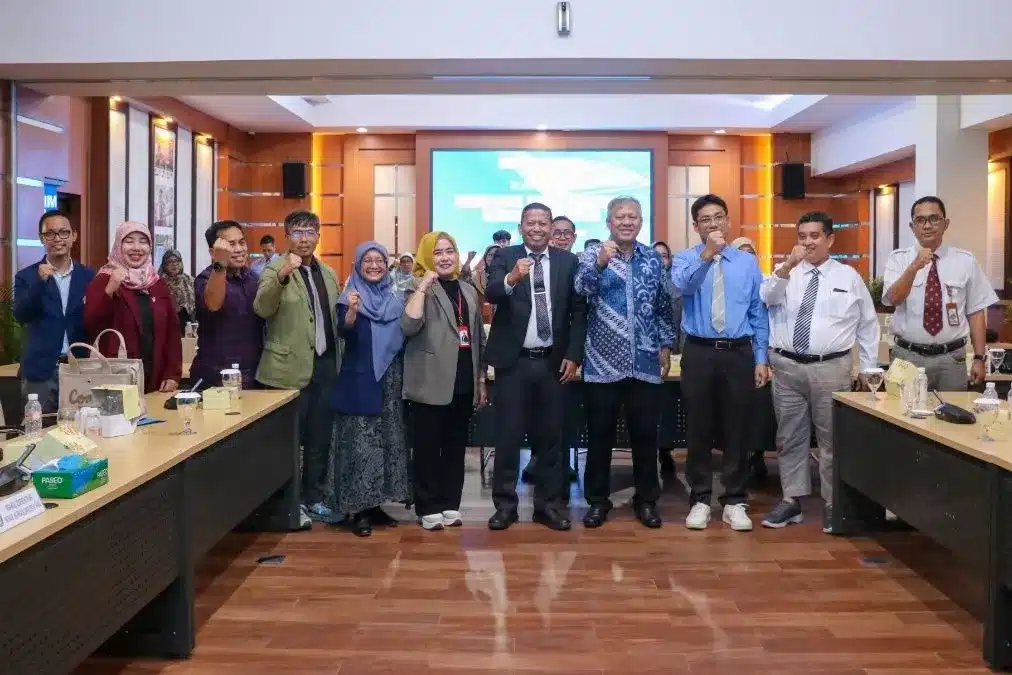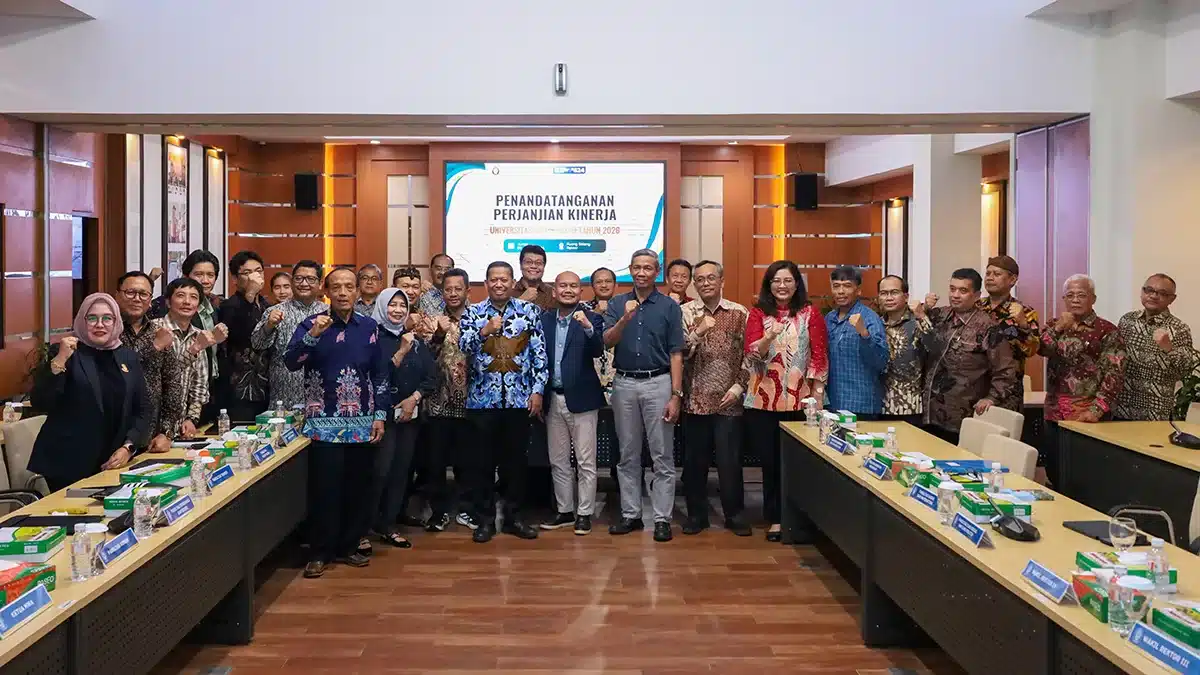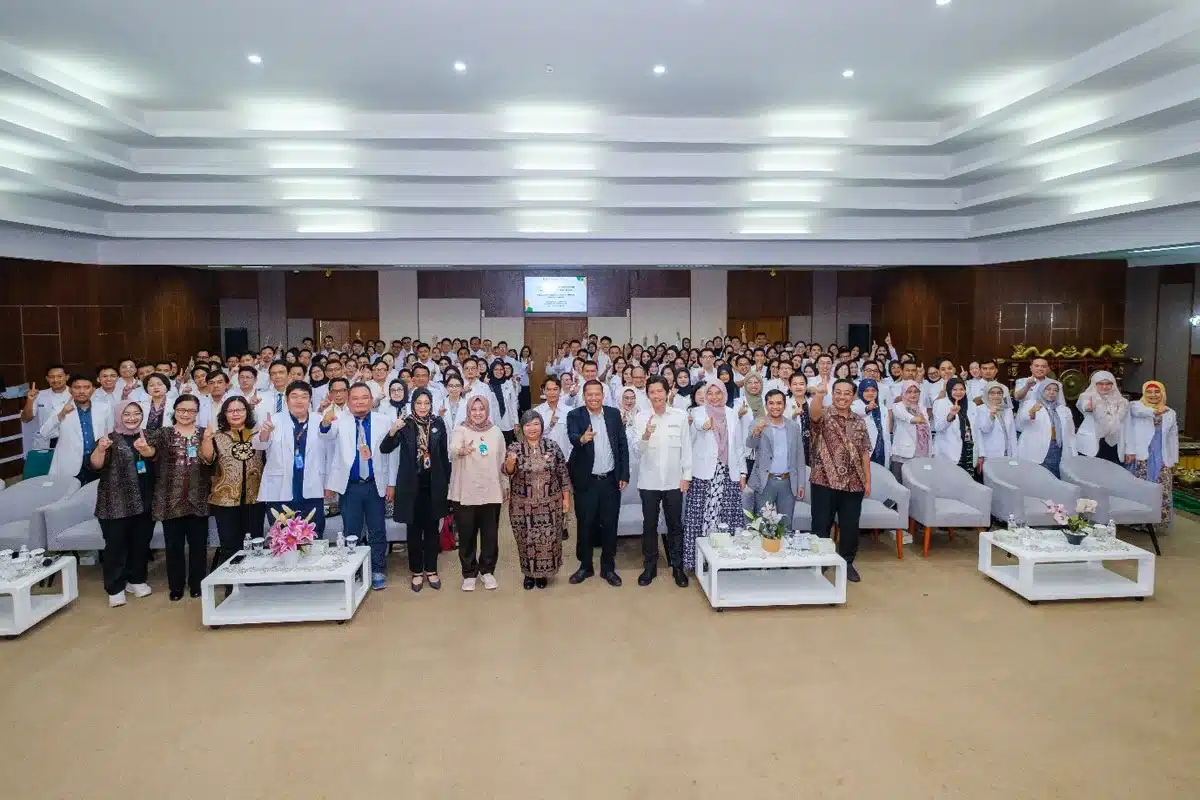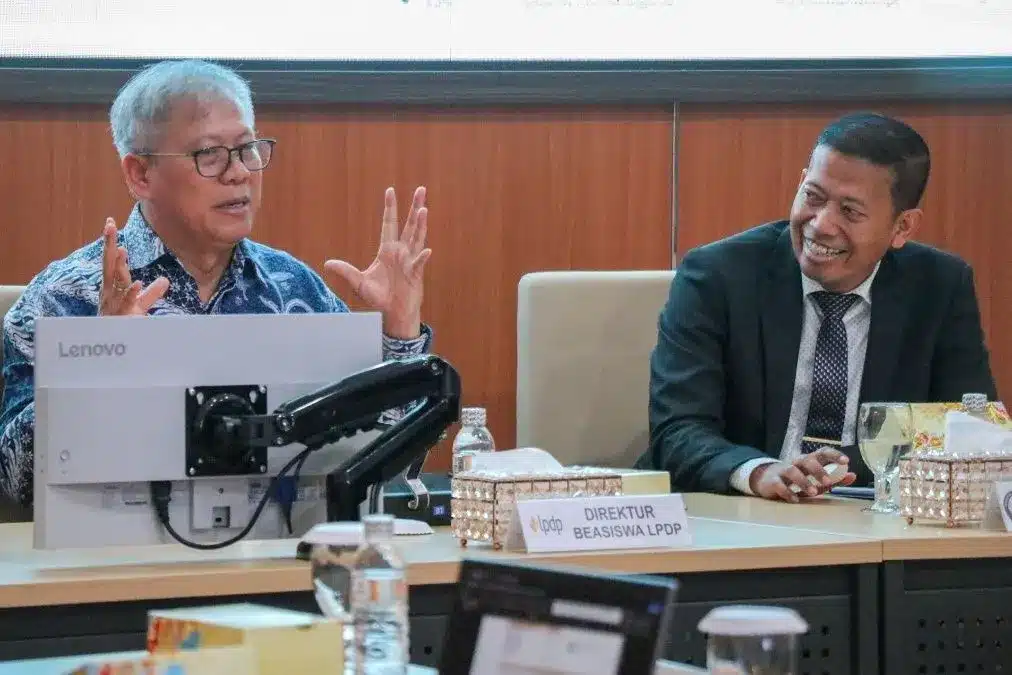UNDIP, Semarang (October 7, 2025) – Universitas Diponegoro (UNDIP) held a guest lecture titled “Building a University-Based Entrepreneurship Factory” with the Director of Scholarships from the Indonesia Endowment Fund for Education (LPDP), Ir. Dwi Larso, M.SIE., Ph.D., on Monday, October 6, 2025, at the Rectorate Meeting Room, Widya Puraya Building, UNDIP Tembalang Campus.
Attended by university leaders, deans, department heads, and lecturers from various faculties, the event served as a forum for reflection and strategic collaboration between higher education institutions and the national education fund agency to build a strong and sustainable entrepreneurial ecosystem.
UNDIP Rector Prof. Dr. Suharnomo, S.E., M.Si. emphasized the importance of synergy between UNDIP and LPDP as a strategic step to strengthen UNDIP’s position as a productive and impactful research university. He expressed gratitude and pride for the appreciation shown by the Minister of National Development Planning/Head of Bappenas RI, Prof. Dr. Ir. Rachmat Pambudy, M.S., for UNDIP’s innovations that have made fundamental contributions to the nation.
“Minister Rachmat was impressed by UNDIP’s diverse research outcomes—from an electric car ready for the highway, the Free Nutritious Meal Program (MBG) consistently running for four years, to a solar-powered desalination machine that withstands vibrations in disaster-prone areas. Moreover, UNDIP has also played a strategic role in the marine and fisheries sector through the export of vannamei shrimp from the Jepara Campus to Japan,” the Rector stated.
Prof. Suharnomo explained that these achievements are the foundation for UNDIP to continue expanding its impact on society. He assigned the Vice Rector for Research, Innovation, Collaboration, and Public Communication to strengthen communication with LPDP, thereby facilitating collaborations in research development, overseas study programs, and academic capacity-building. He believes that the more UNDIP students gain access to global learning opportunities, the stronger the university’s contribution will be to national development.
UNDIP Rector reaffirmed his commitment to expanding access to education through a 20% scholarship policy for high-achieving students in technology fields who face financial limitations. He encouraged more UNDIP students to pursue LPDP scholarships, given their strong potential. Concluding his remarks, he expressed hope that the synergy between UNDIP and LPDP would open wider opportunities for educational investment, double degree programs, and impactful research collaborations for Indonesia.
Meanwhile, Dr. Dwi Larso, in his lecture, highlighted the critical role of universities as talent hubs that nurture resilient and ethical entrepreneurs—the foundation for achieving the Golden Indonesia by 2045.
He noted that Indonesia holds great potential to become a high-income country by 2045. Still, challenges such as high university graduate unemployment and a low Total Entrepreneurial Activity (TEA) index must be addressed. Therefore, universities must transform into structured, systematic, and massive entrepreneurship ecosystems.
Dr. Dwi explained that LPDP serves not only as a funding provider but also as a catalyst for cultivating visionary, impactful future leaders. The Entrepreneurship Factory concept promoted by LPDP integrates entrepreneurship curricula across disciplines, active involvement of academics and practitioners, and supporting facilities such as makerspaces, tech hubs, business incubators, and collaborations with investors and industries. The goal is to produce graduates who are not only job-ready but also capable of creating jobs.
According to LPDP’s roadmap, Indonesia aims to generate 500,000 new entrepreneurs annually until 2029 as part of the national strategy toward the Golden Indonesia. Currently, only about 17.3% of university graduates become entrepreneurs, and LPDP targets to increase that figure to 25% through entrepreneurship scholarships, applied research, and continuous tracer studies.
“The goal is for 25% of university graduates to run their own businesses, with a significantly improved TEA index in cities like Semarang and Solo. This approach aligns with LPDP’s roadmap toward Golden Indonesia 2045, positioning entrepreneurship as a catalyst for sustainable development in the economic, social, and environmental sectors,” explained Dr. Dwi Larso.
He commended UNDIP’s initiative in establishing a University-Based Entrepreneurship Factory as a concrete step to nurture young talents ready to contribute to the nation. Through partnerships with universities like UNDIP, LPDP seeks to strengthen the bridge between education, research, and industry. The Entrepreneurship Scholarship Program serves as a driver for young talents to create innovations and open new economic opportunities across strategic sectors—from green technology and food security to the maritime economy. Dr. Dwi concluded with an inspiring message, “Don’t curse the darkness. Light a flame. Even a small candle can illuminate the way.”
As one of Indonesia’s leading research universities, UNDIP continues to strengthen its role in building a national entrepreneurship ecosystem. Through its Diktisaintek Berdampak program, UNDIP promotes research downstreaming and the development of technology-based start-ups relevant to community needs and global challenges. The University-Based Entrepreneurship Factory initiative also supports SDG 8: Decent Work and Economic Growth, by fostering an entrepreneurial spirit within the academic community to drive inclusive and equitable economic growth.
More than just a concept, this movement embodies the spirit of “Noble and Valuable UNDIP,” where the university’s integrity is realized through its tangible contributions to the nation—through knowledge, innovation, and integrity. The guest lecture concluded with an exchange of souvenirs between the UNDIP Rector and the LPDP Director of Scholarships, followed by a group photo session, symbolizing ongoing collaboration between academia and the national education funding institution. (Public Communication/UNDIP/DHW)










